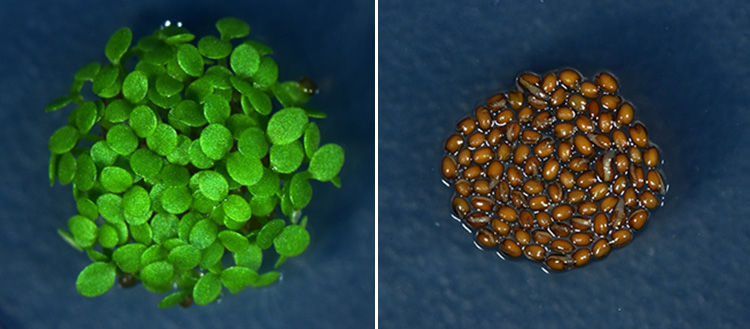Germination: defeating bacteria with their own weapons
When seeds perceive signals from harmful bacteria, they stop germinating to avoid exposing seedlings to the infections.

On the right, germination of Arabidopsis thaliana seeds. On the left, the seeds remain dormant in the presence of Pseudomonas aeruginosa. © UNIGE
The seeds are able to block their germination as long as the environmental conditions are unfavorable. But what happens when they are confronted with dangerous organisms within the surrounding soil? Researchers at the University of Geneva (UNIGE), Switzerland, have studied the impact of Pseudomonas aeruginosa, a bacterium that can be pathogenic to both plants and animals, including humans. They have identified a toxin produced by this bacterium, called AMB, which causes the seeds to block germination without killing the plant. It is therefore likely that, over the course of evolution, the seeds were able to use AMB, a signal emitted by bacteria to coordinate their infection strategies, to protect their own species. These results were published in the journal eLife.
Controlling seed germination allows plants to constantly adapt to a changing environment. The seeds are capable of blocking their germination awaiting optimal conditions in terms of light, temperature or humidity. In the meantime, they maintain the embryo in a very resistant state and avoid exposing the seedling, very fragile, to a hostile environment.
The seeds are also continuously exposed to bacteria, fungi and animals present in the soil, such as worms, that can be a threat to their species. “The control of seed germination by such biotic factors is poorly understood. Therefore, we decided to study this aspect using Pseudomonas aeruginosa, a ubiquitous bacterium that attacks many plants, including Arabidopsis thaliana, a model organism used in laboratories”, explains Luis Lopez-Molina, professor at the Department of Botany and Plant Biology of the UNIGE Faculty of Science.
The seed uses a bacterial weapon
In collaboration with prof. Jean-Luc Wolfender and Dr Emerson Ferreira-Queiroz, of the Geneva-Lausanne School of Pharmacy (EPGL), the researchers identified a toxin produced by P. aeruginosa and called AMB, which blocks germination. “The process induced by AMB probably serves as a protective response to prevent seedlings from suffering serious or even fatal damage after germination due to the presence of this bacterium”, says Hicham Chahtane, first author of the study.
AMB is one of the factors produced by P. aeruginosa when these bacteria reach a high density and need to coordinate the expression of their virulence and resistance factors for maximum infection. The plants therefore seem to have developed their own defense strategy, thanks to the ability of the seeds to perceive a bacterial signal and to respond to it by maintaining their dormant state. “When the threat disappears, these same seeds germinate and develop into healthy seedlings”, adds the biologist.
A universal virulence factor
The Geneva group had already deciphered the mechanisms allowing seeds to make the decision to germinate depending on environmental conditions. “We demonstrate now that AMB activates the same cellular messengers, in this case those who participate in the dialogue between the embryo and its envelope, an organ capable of actively controlling germination”, notes Luis Lopez-Molina. The identification of a biotic compound modulating this specific pathway expands the range of environmental factors capable of eliciting similar responses in response to various types of stress.
The genes responsible for the production of AMB also play a key role in humans infected with P. aeruginosa, as their activation has been demonstrated in patients with cystic fibrosis or keratitis. AMB, one of the virulence factors produced by these bacteria, thus contributes to their aggressiveness, which extends both in the animal and the plant kingdoms.
